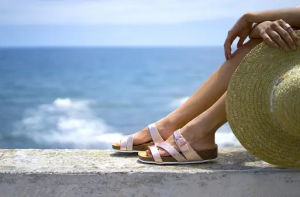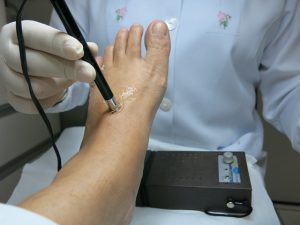As we age, various aspects of our health require extra attention and care, and one often overlooked area is foot health. Our feet are essential for mobility and overall well-being, and neglecting them can lead to discomfort, pain, and reduced quality of life. This piece will talk about why it’s important to take care of your feet as you get older and give adults useful tips on how to keep their feet healthy. When it comes to older patients, we at The Foot and Ankle Clinic know what they need and are here to help them make sure their feet stay healthy and pain-free.
The Aging Foot
As we age, our bodies go through many changes, and our feet are no different. Seniors can make their lives a lot better if they are aware of these changes and do something about them.
Reduced Circulation: With age, blood circulation tends to decrease, which can lead to a decreased supply of nutrients and oxygen to the feet. This can make wounds heal more slowly and raise the risk of getting foot sores. Seniors should maintain regular physical activity to promote circulation and consider compression stockings if advised by a healthcare professional.
Thinning Skin: The skin on the feet becomes thinner and more fragile as we age. This makes seniors more susceptible to skin tears, bruises, and pressure sores. Moisturizing the feet daily and wearing supportive, well-fitted shoes can help protect the skin.
Arthritis And Joint Changes: Arthritis is a common condition among seniors, and it can affect the joints in the feet, causing pain, stiffness, and limited mobility. Gentle exercises, prescribed by a podiatrist at The Foot and Ankle Clinic, can help maintain joint flexibility and reduce discomfort.
Tips For Caring For Aging Feet
Now that we’ve discussed some of the changes that occur in aging feet, let’s explore practical tips for seniors to maintain optimal foot health.
Daily Foot Inspection: Seniors should make it a habit to inspect their feet daily. Look for any cuts, sores, blisters, or changes in color or temperature. Early detection of foot problems is essential for timely intervention.
Proper Hygiene: It’s important to keep the feet clean. Dry them well, especially between the toes, and wash them every day with warm water and light soap. Getting fungal diseases between your toes can happen if they are wet.
Nail Care: Trim toenails straight across to prevent ingrown toenails. If bending is a challenge, seek assistance from a family member or visit The Foot and Ankle Clinic for professional nail care.
Choose The Right Footwear: Seniors need to wear the right shoes. Choose shoes with enough support, cushioning, and space for your toes to move around. Avoid high heels and shoes with narrow-toe boxes. It’s recommended to have your feet measured regularly, and consider custom orthotics if prescribed by a podiatrist at The Foot and Ankle Clinic.
Manage Foot Pain: If you experience foot pain, don’t ignore it. Consult with a podiatrist at The Foot & Ankle Clinic to identify the cause and develop a treatment plan. Foot pain can often be alleviated with orthotics, physical therapy, or other non-invasive treatments.
Stay Active: For good circulation and joint movement, you need to do a lot of physical exercise on a regular basis. Walking, swimming, and tai chi are all low-impact workouts that can be good for adults. Before you start a new workout plan, talk to your doctor or nurse.
Elevate Your Feet: Elevating your feet for short periods during the day can reduce swelling and improve circulation. Sit with your feet up whenever possible, especially if you’ve been on your feet for an extended period.
Watch For Warning Signs: Be aware of any changes in your feet, such as numbness, tingling, or a loss of sensation. These can be signs of neuropathy, a common condition among seniors that requires prompt attention.
Maintain A Healthy Diet: Proper nutrition is crucial for overall health, including foot health. A well-balanced meal full of minerals and vitamins, especially calcium and vitamin D, can help keep bones healthy.
Regular Check-Ups: You should see a doctor at The Foot and Ankle Clinic for regular checkups, especially if you already have diabetes or foot problems. These appointments can help catch potential issues early and provide guidance on foot care.
Conclusion
Taking care of older feet is an important part of senior health. Seniors can keep their feet healthy and live a busy, pain-free life by following these tips and getting professional help from a doctor at The Foot and Ankle Clinic when they need to. Don’t forget about your feet—they support your body and help you move around.





